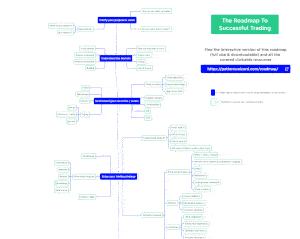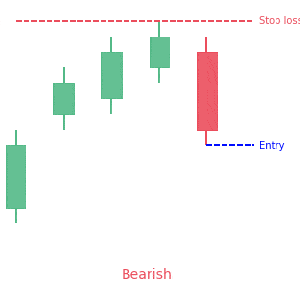Forex trading psychology plays a vital role in determining the success of a forex trader. Why so? Because forex trading can be challenging for most of us. It requires more than just technical analysis and strategies. Therefore, the psychological aspects of forex trading can play a key role in determining your success.
If you want to know about forex trading psychology tips, then you are on the right platform. In this article, we are going to help you understand how to manage your emotions and maintain a disciplined trading approach. Let’s begin right away.
What is trading psychology?
As you know, the emotional and mental aspects of traders influence their decision-making process. This is trading psychology and it is the study of the psychological and emotional factors that can impact a trader’s decision-making process, including their thoughts, emotions, biases, and reactions to market events.
Traders’ psychological state can have a significant impact on their success in the markets. Traders who are able to manage their emotions and maintain a disciplined approach to trading are more likely to make rational decisions and achieve long-term success. On the other hand, traders who allow their emotions to cloud their judgment are more likely to make impulsive and irrational decisions that can lead to losses. Therefore, it is important to manage your emotions and maintain a disciplined approach to trading.
5 forex trading psychology tips
Here are some forex trading psychology tips for managing emotions in trading.
1. Develop a detailed trading plan
A detailed trading plan that covers various aspects of trading is the perfect way to avoid the adverse effects of forex trading psychology. The following are some key aspects that you need to cover in your trading plan.
- Develop a trading strategy: Having a clear trading strategy helps greatly in forex trading. It empowers you to follow your strategy and avoid making irrational decisions.
- Define entry and exit points: A perfect trading plan also contains well-defined entry and exit points. It helps you avoid making impulsive decisions based on emotions.
- Use stop-loss orders: A stop-loss order helps you limit your losses and reduce the emotional impact of market fluctuations.
- Manage your risk: It’s important to manage your risk by limiting the amount of money you are willing to risk on any given trade. This can help you avoid making emotional decisions based on the potential for large gains.
- Keep a trading journal: Keeping a journal can help you identify patterns in your emotions and behaviors while trading. This can help you develop strategies to manage your emotions in the future.
- Backtesting and refining: Backtesting and refining trading strategies give you more confidence. Thus, it also helps in avoiding making emotional decisions.
2. Practice discipline
Discipline is essential for forex trading success. This means following your trading plan, setting realistic goals, and having the patience to wait for the right opportunities. Additionally, avoid overtrading and stick to your risk management strategy. Moreover, practicing discipline is extremely helpful in trading psychology because it helps traders to stay focused on their goals and avoid making impulsive decisions that can negatively affect their trading performance.
How practicing discipline helps in forex trading psychology?
Here is how practicing discipline helps in forex trading psychology.
- Helps control emotions: Trading can be an emotional rollercoaster, and emotions like fear, greed, and FOMO can lead to irrational decision-making. By practicing discipline, traders can learn to control their emotions and stick to their trading plan, even in the face of challenging market conditions
- Improves consistency: Successful trading requires consistency in decision-making and execution. When traders are disciplined, they are more likely to stick to their trading plan, trade with a consistent strategy, and manage their risk effectively.
- Reduces impulsivity: Impulsive trading can lead to significant losses. By practicing discipline, traders can reduce their impulsivity and avoid making rash decisions based on emotions or short-term market movements.
- Increases focus: Trading requires a high level of concentration and focus. By practicing discipline, traders can improve their ability to focus on their trading plans and execute trades effectively.
How to practice discipline?
- Develop a trading plan: A well-defined trading plan helps you to stay disciplined by providing a clear framework for decision-making.
- Stick to your plan: Once you have a trading plan in place, stick to it. Don’t let emotions or short-term market movements derail your strategy.
- Set realistic goals and use stop-loss orders: Set realistic goals to enable you to take a profit at the right time. Whereas, stop-loss orders limit your losses and prevent you from making impulsive trading decisions.
3. Learn from your mistakes
Making mistakes is a natural human phenomenon and also a part of forex trading. However, it is essential to learn from your mistakes. Using mistakes as a learning experience to improve your trading strategy can turn things around for you. Therefore, always keep a trading journal to analyze your trades and identify areas for improvement.
Furthermore, it is important to understand that learning from your mistakes is crucial in trading psychology. It helps traders develop the discipline, self-awareness, and resilience needed to be successful in the markets. When traders make mistakes, whether it be a bad trade or a poor decision, it can be easy to get caught up in negative emotions like regret, frustration, or fear. However, if traders take the time to reflect on their mistakes, they can gain valuable insights into their decision-making process. Thus, it helps in developing strategies to avoid repeating the same mistakes in the future.
4. Stay focused
Forex trading can be a demanding activity that requires focus and concentration. Therefore, avoid distractions and maintain a clear head when making trading decisions. Additionally, it is important to stay alert and aware of market conditions and news that may impact your trades.
5. Practice self-care
Forex trading can be a stressful activity that can take a toll on your mental and physical health. Practice self-care by taking breaks, getting enough rest, exercising, and engaging in activities that help you relax and reduce stress. In fact, a healthy mind and body are essential for success in forex trading. Here are the points where practicing self-care helps:
- Stress reduction: Trading can be a stressful activity, and stress can interfere with trading performance. Engaging in self-care activities such as exercise, meditation, and relaxation techniques can help reduce stress levels and improve trading focus and decision-making.
- Better emotional regulation: Trading psychology involves managing emotions, such as fear, greed, and anxiety. Practicing self-care can improve emotional regulation skills, making it easier to stay calm and focused when trading.
- Improved mental and physical health: Self-care activities such as eating a healthy diet, getting enough sleep, and engaging in regular physical activity can improve mental and physical health. This can lead to increased resilience, better decision-making, and improved trading performance.
 Good Trading requires the Best Charting Tool!
Good Trading requires the Best Charting Tool!

 We loved Marwood Research’s course “Candlestick Analysis For Professional Traders“. Do you want to follow a great video course and deep dive into 26 candlestick patterns (and compare their success rates)? Then make sure to check this course!
We loved Marwood Research’s course “Candlestick Analysis For Professional Traders“. Do you want to follow a great video course and deep dive into 26 candlestick patterns (and compare their success rates)? Then make sure to check this course!